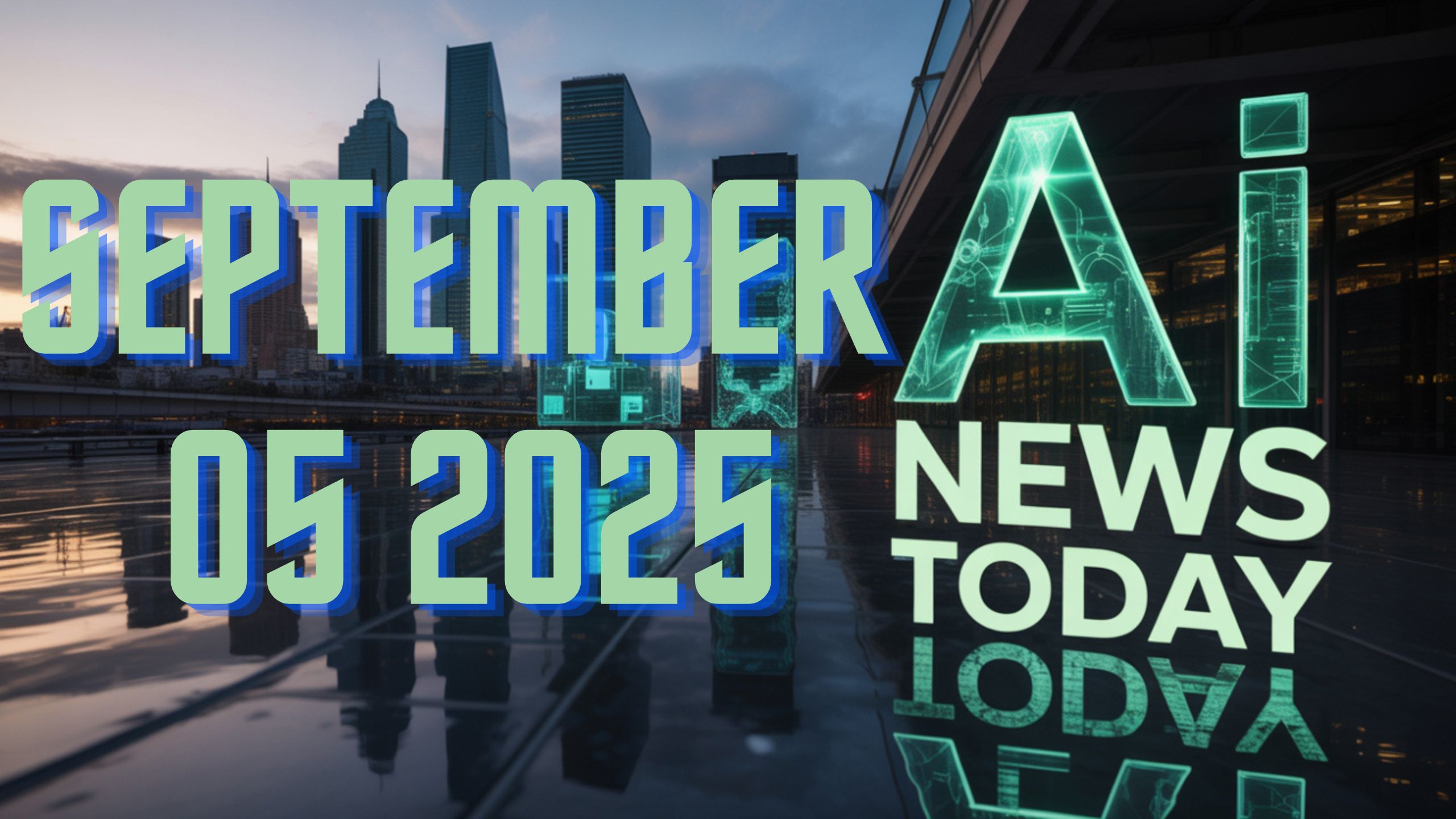AI News Daily — USA (Friday, September 5, 2025)– Artificial intelligence continues to dominate the national conversation as the United States government, regulators, and industry leaders push new initiatives shaping education, technology infrastructure, workforce development, and financial investment. On September 5, 2025, AI policy and innovation momentum accelerated, with major announcements from the White House, the Federal Trade Commission, and leading AI firms.
White House Champions AI Integration in U.S. Education
The White House has unveiled a comprehensive initiative to embed AI into American classrooms, marking one of the boldest government-led education technology programs in recent history. The plan follows a high-profile summit with CEOs from Google, Microsoft, and OpenAI, where leaders agreed to accelerate the development of digital curricula, classroom tools, and AI-powered platforms designed for K-12 and higher education systems.
The initiative seeks to:
- Provide personalized learning experiences for students through adaptive AI tutors.
- Modernize public school curricula with AI literacy programs, preparing the next generation for a technology-driven economy.
- To reduce administrative burden, equip teachers with AI-powered grading, lesson planning, and classroom management tools.
- Close educational gaps by offering equitable access to AI-driven resources in underserved districts.
By institutionalizing AI in public schools, the White House aims to position the U.S. as a global leader in AI-enabled education while responding to concerns that American students risk falling behind in digital literacy compared to international peers.
FTC Expands Investigation into AI Chatbot Risks
The Federal Trade Commission (FTC) announced an expanded probe into AI chatbot risks, reflecting rising regulatory attention on privacy, safety, and addictive design features. Platforms from OpenAI, Google, and Meta are under increased scrutiny as regulators examine:
- Data privacy concerns surrounding sensitive user information.
- Risks of child exploitation or manipulation through conversational AI.
- The role of gamification and addictive features in chatbot engagement.
- Transparency in how AI systems collect, store, and share user data.
This move follows direct discussions between President Trump and leading tech executives, where both sides emphasized balancing innovation and responsibility. The FTC’s expanded mandate signals a more challenging regulatory environment for chatbot providers, with potential new guidelines and enforcement actions on the horizon.
Anthropic Blocks Chinese-Owned Entities
As geopolitical tensions escalate, Anthropic has taken the significant step of barring Chinese-owned companies from accessing its AI products and platforms. This policy shift reflects growing concerns within the U.S. government about technology transfer, cybersecurity, and intellectual property protection in the AI sector.
By formally restricting access, Anthropic joins a wave of U.S. tech firms aligning with national security directives to limit exposure to foreign influence. The decision underscores the increasingly strategic role of AI in global power dynamics, where access to advanced systems can have broad economic and military implications.
This move may also influence broader industry norms, pushing other AI companies to adopt similar restrictions, potentially reshaping international AI collaboration and competition.
OpenAI Advances Custom AI Chips and Jobs Platform
OpenAI is making aggressive moves to solidify its infrastructure and workforce leadership. The company confirmed plans for its first custom AI chip, built in collaboration with Broadcom, with a target launch date in 2026. This hardware initiative is designed to:
- Reduce reliance on NVIDIA GPUs, which currently dominate the AI chip market.
- Enhance performance for OpenAI’s growing ecosystem of products, from ChatGPT to enterprise solutions.
- Support scalability as demand for AI computation power continues to skyrocket.
Alongside the chip project, OpenAI revealed that it is developing a professional networking platform positioned as a direct competitor to LinkedIn. The platform will leverage AI-driven career matching, recruitment analytics, and skills-based job recommendations to reshape how U.S. workers connect with opportunities in a rapidly evolving labor market.
These dual announcements highlight OpenAI’s strategy to control both the technical backbone and the talent pipeline of the AI industry, reinforcing its position as one of the most influential players in global artificial intelligence.
SoFi Launches Agentic AI ETF for Investors
In the financial sector, SoFi has debuted the Agentic AI ETF (ticker: AGIQ), an exchange-traded fund tracking U.S. companies leading in autonomous systems and artificial intelligence. This launch reflects explosive investor demand for exposure to AI innovation following high-profile product rollouts and policy shifts.
The ETF will include firms engaged in:
- Autonomous vehicles and robotics.
- AI software and cloud platforms.
- Semiconductor and chip design companies powering machine learning.
- Financial services and fintech companies are leveraging AI for automation.
By creating AGIQ, SoFi offers retail and institutional investors a way to directly capitalize on AI growth, while diversifying exposure across multiple sectors. The timing of this launch positions SoFi at the forefront of AI-driven investment products, aligning with broader market enthusiasm for artificial intelligence as a transformative economic force.
AI Policy and Innovation in the U.S.: A Turning Point
The September 5, 2025, events represent a convergence of policy, regulation, technology, and finance that will shape the future trajectory of AI in the United States. Key themes emerging from this moment include:
- Education Transformation – Federal backing for AI-driven learning ensures long-term workforce readiness.
- Regulatory Oversight – The FTC’s expanded role signals a more cautious approach to chatbot development.
- Geopolitical Strategy – Tech companies like Anthropic are aligning with U.S. security priorities.
- Infrastructure Evolution – OpenAI’s custom chip project marks a new chapter in reducing reliance on global supply chains.
- Investor Engagement – Financial firms are packaging AI innovation into accessible investment vehicles.
These developments highlight a nation embracing innovation and reinforcing safeguards, setting the stage for America’s AI leadership in the global economy.
Wrap Up
As the U.S. strengthens its AI ecosystem across education, regulation, security, infrastructure, and finance, September 5, 2025, may be remembered as a defining date in the institutionalization of artificial intelligence. With government, industry leaders, and investors aligned, the coming years promise profound shifts in how AI is deployed, regulated, and monetized across American society.

Selva Ganesh is a Computer Science Engineer, Android Developer, and Tech Enthusiast. As the Chief Editor of this blog, he brings over 10 years of experience in Android development and professional blogging. He has completed multiple courses under the Google News Initiative, enhancing his expertise in digital journalism and content accuracy. Selva also manages Android Infotech, a globally recognized platform known for its practical, solution-focused articles that help users resolve Android-related issues.




Transparency will be key for public trust in AI advancements.
Curious how other countries will respond to this momentum.
This announcement from the White House is huge for the tech sector.
Investment in AI infrastructure will help smaller companies too.
AI ethics need to be a top priority in all these initiatives.
AI should complement human skills, not just replace them.
This announcement from the White House is huge for the tech sector.
AI in education could really transform classrooms.
Investment in AI infrastructure will help smaller companies too.
Exciting times! But also a little concerning in terms of job security.
Important step forward for America’s role in AI leadership.
AI in education could really transform classrooms.
Interesting to see the FTC so involved in AI-related issues.
Interesting to see the FTC so involved in AI-related issues.
Government, industry, and education working together is smart.
I think public-private partnerships will be vital here.
Infrastructure investment will pay off in the long run.
Government, industry, and education working together is smart.
Exciting times! But also a little concerning in terms of job security.
Exciting times! But also a little concerning in terms of job security.
Hopefully, these moves create more high-paying jobs.
The pace of AI innovation in the US is incredible right now.
AI should complement human skills, not just replace them.
Government, industry, and education working together is smart.
We need to ensure AI doesn’t deepen inequality.
This feels like a turning point for artificial intelligence.
Education reform around AI is long overdue.
Regulation is necessary, but it shouldn’t slow down innovation.
We need to ensure AI doesn’t deepen inequality.
Glad to see collaboration between regulators and industry leaders.
AI ethics need to be a top priority in all these initiatives.